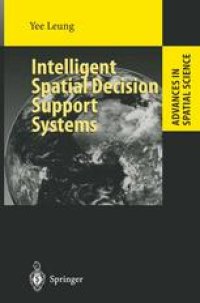
Ebook: Intelligent Spatial Decision Support Systems
Author: Prof. Dr. Yee Leung (auth.)
- Tags: Regional/Spatial Science, Geographical Information Systems/Cartography, Information Systems and Communication Service, Operations Research/Decision Theory
- Series: Advances in Spatial Science
- Year: 1997
- Publisher: Springer-Verlag Berlin Heidelberg
- Edition: 1
- Language: English
- pdf
In the past half century, we have experienced two major waves of methodological development in the study of human behavior in space and time. The fIrst wave was the well known "quantitative revolution" which propelled geography from a mainly descriptive discipline to a scientifIc discipline using formalism such as probability, statistics, and a large-number of mathematical methods for analyzing spatial structures and processes under certainty and uncertainty. The second wave is the recent advancement of geographical information systems which equips geographers with automation in the storage, retrieval, analysis, and display of data. Both developments have significant impacts on geographical studies in general and solutions to real life spatio-temporal problems in particular. They have found applications in urban and regional planning, automated mapping and facilities management, transportation planning and management, as well as environmental planning and management, to name but a few examples. Both developments have one thing in common. They one way or the other use computer to process and analyze data. However, not until recently, there has been very little interaction between the two. Quantitative models have largely been developed independent of the underlying data models and structures representing the spatial phenomena or processes under study. Display of analysis results has been primitive in terms of the utilization of computer graphic technologies. Formal models, in addition to their technical difficulties, have poor capability in communication with users. Geographical information systems, on the other hand, have originally been developed with a slight intention to entertain powerful analytical models.
This book lays a foundation on the conceptual, theoretical, system-development, and application perspectives of intelligent spatial decision support systems. Departing from conventional approaches that only concentrate on model-data integration, the author places emphasis on the artificial intelligence approach to spatial decision support. In addition to the employment of models, it is argued that systems that can perform commonsense reasoning are of paramount importance in spatial decision support. Fundamental concepts of knowledge representation and inference in spatial decision support systems are investigated. Both the symbolic and distributed approaches are examined. Automatic knowledge acquisition by genetic algorithms is discussed.
This book lays a foundation on the conceptual, theoretical, system-development, and application perspectives of intelligent spatial decision support systems. Departing from conventional approaches that only concentrate on model-data integration, the author places emphasis on the artificial intelligence approach to spatial decision support. In addition to the employment of models, it is argued that systems that can perform commonsense reasoning are of paramount importance in spatial decision support. Fundamental concepts of knowledge representation and inference in spatial decision support systems are investigated. Both the symbolic and distributed approaches are examined. Automatic knowledge acquisition by genetic algorithms is discussed.
Content:
Front Matter....Pages I-XV
Introduction....Pages 1-10
Symbolic Approaches to Spatial Knowledge Representation and Inference....Pages 11-57
Fuzzy Logic Approaches to Spatial Knowledge Representation and Inference....Pages 59-124
Management of Uncertainty in Knowledge Representation and Inference....Pages 125-171
Neural Network Approaches to Spatial Knowledge Representation and Inference....Pages 173-227
Knowledge Acquisition for Spatial Inference — The Case of Genetic Algorithms....Pages 229-268
Spatial Data Models and Data Structures....Pages 269-331
Management of Models in Spatial Decision Support Systems....Pages 333-355
An Expert System Shell for Building Spatial-Decision-Support-System Development Tool....Pages 357-391
A Spatial Decision Support System for Flood Simulation and Damage Assessment Using FLESS....Pages 393-409
An Object-Oriented Expert System Shell for Building Spatial Decision Support Systems....Pages 411-428
Conclusion....Pages 429-432
Back Matter....Pages 433-472
This book lays a foundation on the conceptual, theoretical, system-development, and application perspectives of intelligent spatial decision support systems. Departing from conventional approaches that only concentrate on model-data integration, the author places emphasis on the artificial intelligence approach to spatial decision support. In addition to the employment of models, it is argued that systems that can perform commonsense reasoning are of paramount importance in spatial decision support. Fundamental concepts of knowledge representation and inference in spatial decision support systems are investigated. Both the symbolic and distributed approaches are examined. Automatic knowledge acquisition by genetic algorithms is discussed.
Content:
Front Matter....Pages I-XV
Introduction....Pages 1-10
Symbolic Approaches to Spatial Knowledge Representation and Inference....Pages 11-57
Fuzzy Logic Approaches to Spatial Knowledge Representation and Inference....Pages 59-124
Management of Uncertainty in Knowledge Representation and Inference....Pages 125-171
Neural Network Approaches to Spatial Knowledge Representation and Inference....Pages 173-227
Knowledge Acquisition for Spatial Inference — The Case of Genetic Algorithms....Pages 229-268
Spatial Data Models and Data Structures....Pages 269-331
Management of Models in Spatial Decision Support Systems....Pages 333-355
An Expert System Shell for Building Spatial-Decision-Support-System Development Tool....Pages 357-391
A Spatial Decision Support System for Flood Simulation and Damage Assessment Using FLESS....Pages 393-409
An Object-Oriented Expert System Shell for Building Spatial Decision Support Systems....Pages 411-428
Conclusion....Pages 429-432
Back Matter....Pages 433-472
....